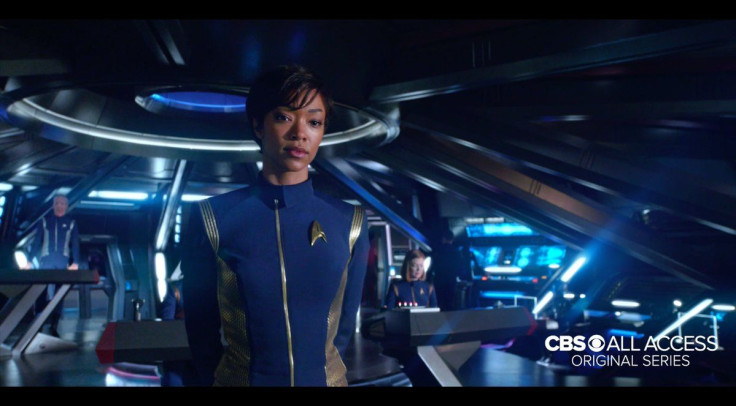The first trailer for Star Trek: Discovery debuted at Wednesday’s CBS upfront presentation, finally, truly unveiling just what sort of show Star Trek: Discovery will be. And while it’d be stupid to say whether Star Trek: Discovery is going to suck or soar based on this first trailer, there are a few observations and judgments worth making. Most strikingly, this is a Star Trek that doesn’t look much like any other, despite taking place in close proximity to Star Trek: The Original Series (Discovery is set approximately ten years before the USS Enterprise’s five-year mission). So much in Discovery is radically different from past Star Treks. Even the Klingons are different. The team behind Star Trek: Discovery has chosen novelty over fidelity to canon. It was the right choice.
One of the clearest plot threads (and biggest changes) in the first Star Trek: Discovery trailer is the re-exoticization of the Klingons. As allies in The Next Generation and Deep Space Nine (excepting a brief brush-fire war), Klingons went from implacable enemy to aggressive space-friends. Star Trek is always, in part, about shared values between seeming enemies. It looks like Star Trek: Discovery will be about that initial discovery between us and them.
It’s clear a storytelling choice has been made here. And whatever efforts in canon pedantry try and fit these new Klingons in with the ridgeless Klingons of The Original Series, the decision to radically change the Klingons is all about making them scary again. As much as their Conan the Barbarian hair will be missed, the new look accomplishes that alienation. From their funereal ceremony — complete with Klingon death ritual roar — to their spiky armor, these Klingons aren’t anything like Worf. The final moment in the trailer, with Commander Michael Burnham (Sonequa Martin-Green) facing off against a Klingon leader girded in imposing battle armor and armed with a bat’leth, suggests the reinvention works. It’s a shot with genuine menace, something the Klingons haven’t been able to conjure in decades.
Part of that effort to reassert the alien (and reemphasize discovery) in Star Trek: Discovery also comes in the casting. In the trailer we see members of bridge crew aboard the USS Shenzhou, with a particular focus on the part-Vulcan Burnham, a cyborg and two alien crewmembers (Captain Georgiou, played by Michelle Yeoh, probably won’t be around long). One of the alien crewmembers, Lt. Saru (Doug Jones) comes from a species “biologically determined for one purpose alone — to sense the coming of death.” Whatever that means, it’s definitely weird and alienating. Star Trek: Discovery looks like the first Star Trek where practically everyone is a Data or Odo, trying to find their way forward in a confusing matrix of multi-species social interaction. Once again, rather than stocking the crew with the regular species, Star Trek: Discovery has chosen novelty over canon to emphasize its themes.
Despite its snug proximity to the original Star Trek and it’s repertoire of overlap characters like Spock’s dad Sarek and the return of Harry Mudd, the entire series aesthetic is a stark contrast from the TOS era, with radically different uniforms and ship interiors. The series seems determined to avoid the squared off 60s modishness of the original, the pastel 90s lounge furniture of The Next Generation and the Apple product all-white of the reboot movie series. Instead, the bridge we see in the Star Trek: Discovery trailer is dark, with exposed beams and computer interfaces unlike LCARs or the recent movies. It’s appealingly chunky, but a bit dark for the typical Star Trek aesthetic, more like Mass Effect or The Expanse. And while the look gives me mixed feelings — the early 2000s lens flare and blown-out lighting doesn’t help — it’s definitely in line with Discovery’s efforts to show us something new, even if it doesn’t match our canonical expectations. Questions like “is this too modern for a prequel series?” are beside the point.
Except for a handful of screwballs who’d rather see CBS’s stupid streaming service fail than Star Trek succeed, we all want Star Trek: Discovery to be great. The only problem is in defining a great Star Trek series. Some insisted the new series must be set after Deep Space Nine, addressing the galactic geopolitics after the Dominion War, which ends more than a hundred and twenty-five years after the Discovery time period. There were incessant debates over whether or not Discovery would be set in the Prime timeline of the TV series or the Kelvin timeline of the reboot movies (most recently, Star Trek Beyond). And everyone had an opinion on the first reveal of the titular ship, USS Discovery NCC-1031, which was so reviled that the redesigned Discovery doesn’t even appear in the first trailer for the series.
So it’s entirely possible fandom will reject Discovery. But it’d be a mistake to assume that Discovery ignores the Star Trek legacy or attempts to reject Star Trek as the fans define it. Though it’s commonly assumed in gripes and comments that people working on beloved properties don’t have sufficient knowledge and don’t care to get it right, that’s definitely not the case with the Star Trek: Discovery development and writing team. With Kirsten Byer, author of numerous Star Trek novels and Wrath of Khan director Nicholas Meyer onboard, it can’t be said that Star Trek: Discovery is ignoring the Trek past. They’re just doing that whole “boldly going” thing. Even if that flies in the face of finicky continuity purists, it was the right choice.
Now we just have to hope it pays off. Star Trek: Discovery premieres this fall on, ugh, CBS All Access.


















